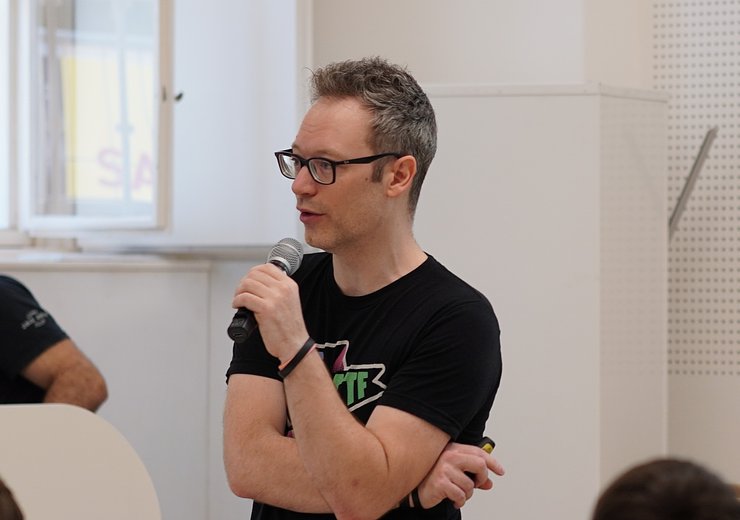International Ethical Hacking Boot Camp: 2nd Edition
boot camp | ˈbo͞ot ˌkamp | noun. a short, intensive, and rigorous course of training.

Picture: Marco Squarcina
In the beginning of June, 130 upcoming talents in cybersecurity from all over Europe came together at TU Wien to learn from and compete with one another at the International Ethical Hacking Bootcamp. The boot camp ran over the course of 3 days, with expert panels and a Capture-The-Flag competition.
That Cybersecurity is an important topic is yesterday’s news – but with new threats looming large, it’s become more and more important to educate and train young talents in how to respond to these threats. What better way to do this than to throw a boot camp? For this exact reason, the International Ethical Hacking Bootcamp, organized by the TU Wien Cyber Security Center, Cyber Security Austria, and ViSP, entered its second edition this year. Participants came together in Vienna to prepare for the European Cybersecurity Challenge (ECSC) 2024. This time, the national ECSC teams from Austria, Croatia, Czechia, Hungary, Slovakia, Slovenia, Serbia, Germany, Switzerland, and Italy, as well as 20 of the best talents from team Europe, were invited to join.
The boot camp follows previous ethical hacking activities organized over the past 2 years, like hosting the talents of Team Europe in May 2022 and organizing the ECSC in October 2022, which attracted over 700 participants from 34 countries. All of those activities are now gaining traction and are putting Vienna on the map as a hub for cybersecurity. Our Dean Gerti Kappel and TU Wien Rector Jens Schneider also dropped by to see all the ethical hackers in action.
For three days, the teams worked on specific security terrains to prepare for the ECSC. Experts from both academy and industry shared their insights and knowledge on cryptography (Lena Csomor), security of industrial control systems (Johannes Kadak), binary exploitation (Mario Polino and Jannik Hartung), and, in collaboration with the European Space Agency (ESA), satellite security (Yohann Roiron). But what would a boot camp be without a little bit of friendly competition? To tap into all the creative hacking power, the teams mixed to participate in a tough Capture-The-Flag (CTF) competition. To make things even more intense, a time limit of 8 hours was set for the teams to solve all 27 challenges of the CTF.
Using ethical and hacking in the same sentence sounds like a contradiction? Marco Squarcina (Senior Scientist at TU Wien Informatics), organizer of the event and coordinator of the Ethical Hacking Initiative of TU Wien, knows that it’s not: “People have been asking me for many years why I include offensive security topics in my teaching – but the thing I always tell them is: How can you design a secure lock if you never picked one? You need to master lockpicking techniques to create a solution that will withstand even the most sophisticated attacks. And there is no way to do so without understanding these attacks in detail and practicing them.”
The International Ethical Hacking Bootcamp is, however, not just a way to see what the competition is all about, but it’s also an opportunity for community building, and to create an environment that fosters collaboration and out-of-the-box thinking. To encourage international relationships and get in a little non-hacking-related fun as well, activities like a quiz about IT security (and beyond!), dinner, and bowling were organized with the great support of Georg Merzdovnik and Michael Pucher from SBA Research.
If all of this got you curious about ethical hacking, and how to get training and education in cybersecurity in one of the most livable cities in the world, you should definitely check out our bachelor courses. We look forward to creating these opportunities and welcoming fresh talents and again next year, and with that, we want to thank all organizing and industry partners, without whom the event could not have taken place.
A special thanks also goes out to all the participants for their vigor and engagement when it comes to cybersecurity!
Organizing team
- Joe Pichlmayer, CEO @ IKARUS
- Marco Squarcina, Senior Scientist @ TU Wien
- Manuel Reinsperger, Pentest @ A1Digital and TU Wien student
- Lea Holter, TU Wien student
- Patrick Pirker, Pentest @ Syslifters
About ECSC
The European Cyber Security Challenge (ECSC) is the biggest cybersecurity competition in Europe. The initiative by the European Union Agency for Cybersecurity (ENISA) aims to enhance cybersecurity talent across Europe and connect high potentials with industry-leading organizations. European countries host national cybersecurity competitions, with the winners representing their countries in the ECSC. openECSC offers excellent opportunities to train for the national and European cybersecurity challenges – regardless of age, nationality, professional or educational background.
Curious about studying cybersecurity in Vienna?
Watch on YouTube: https://youtu.be/Z9Jiq4sWRmk
Curious about our other news? Subscribe to our news feed, calendar, or newsletter, or follow us on social media.









